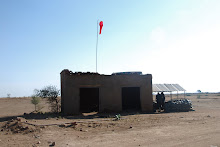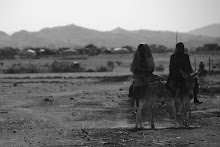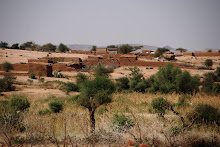Residents, or at least a few powerful leaders, of Kalma camp in South Darfur and two other camps in North Darfur have rejected offers of humanitarian assistance.
In both written and spoken statements, camp spokesmen claim they cannot accept national or international NGOs that were not expelled from the country to fill the gaps in medical, sanitation, schooling or other services left by the recent expulsions of nearly half of the aid organizations operating in Darfur.
At best, this refusal represents the consensus of a group of violence-affected and wary residents mistrustful of the intentions of the government - believing that any agency left operating in Darfur is either too biased or too weak to be of any good.
At worst, the refusal is the result of manipulative rebel leaders wagering the suffering of their supporters against the possibility of portraying a negative media image of the Sudanese regime.
In theory, it doesn’t matter. Humanitarianism, by its very nature, is supposed to be above the fray. As long as civilians are suffering during wartime due to factors beyond their control, humanitarian workers should provide assistance.
Yet, it seems to matter. Engaging with IDP leaders who have refused aid (through dialogue, persuasion, or negotiation) in order to continue providing services sets a disturbing precedent. The refusal will continue until leaders feel they are loosing more than they are gaining from the current tactic – which may be after a significant number of deaths. And anything we, as a humanitarian community, give to these leaders is chalked up in the gains column (be it legitimacy, political advocacy, or physical assistance).
At the very least, the leaders should be held publicly accountable for the crimes.
In Darfur in the past year, there have been many examples of such 'humanitarian bargaining'. In one camp, fearing a retaliatory attack by militia groups after killing some members of the groups, residents of one West Darfur IDP camp took hostages and demanded the arrival of UN ‘protection’ troops before their release.
In another case, camp leaders in North Darfur refused access to UNAMID police and military patrols for months until compensation was paid to the owner of a motorcycle damaged by a UNAMID vehicle during an earlier patrol.
One of the most valuable commodities that IDPs have ownership of is their own image as victims/recipients. For Darfuris, that image has become quite prominent and hence a powerful negotiating tool – perhaps, an unintended consequences of the huge American advocacy campaign for action in Darfur.
The question now, is how far are we willing to compromise humanitarian principles of neutrality and impartiality to give aid? Can we let a group of people dictate the terms of aid just to ease our conscience over letting people die in faraway places?
How is this refusal substantively different than the Sudanese government’s harassment of NGOs - except without the excuse of sovereignty?
Should the leaders who have orchestrated the refusal be condemned publicly by UNAMID for the crime of denying humanitarian access to suffering civilians?
Wednesday, March 25, 2009
Subscribe to:
Post Comments (Atom)













































No comments:
Post a Comment